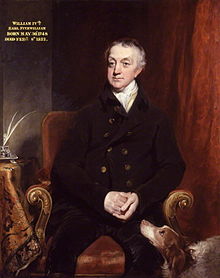The Earl Fitzwilliam | |
|---|---|
 Portrait by William Owen, 1817 | |
| Earl Fitzwilliam | |
| In office 10 August 1756 – 8 February 1833 | |
| Preceded by | William Fitzwilliam |
| Succeeded by | Charles Wentworth-Fitzwilliam |
| Lord Lieutenant of Ireland | |
| In office 13 December 1794 – 13 March 1795 | |
| Monarch | George III |
| Prime Minister | William Pitt the Younger |
| Preceded by | The Earl of Westmorland |
| Succeeded by | The Earl Camden |
| Lord President of the Council | |
| In office 1 July – 17 December 1794 | |
| Monarch | George III |
| Prime Minister | William Pitt the Younger |
| Preceded by | The Earl Camden |
| Succeeded by | The Earl of Mansfield |
| In office 19 February – 8 October 1806 | |
| Monarch | George III |
| Prime Minister | Lord Grenville |
| Preceded by | The Earl Camden |
| Succeeded by | Viscount Sidmouth |
| Personal details | |
| Born | William Wentworth-Fitzwilliam 30 May 1748 |
| Died | 8 February 1833 (aged 84) |
| Nationality | British |
| Political party | Whig |
| Spouses | Lady Charlotte Ponsonby
(m. 1770; died 1822)Hon. Louisa Molesworth
(m. 1823; died 1824) |
| Children | Charles Wentworth-Fitzwilliam, 5th Earl Fitzwilliam |
| Parents |
|
William Wentworth-Fitzwilliam, 4th Earl Fitzwilliam, PC (30 May 1748 – 8 February 1833), styled Viscount Milton until 1756, was a British Whig statesman of the late 18th and early 19th centuries. In 1782 he inherited the estates of his uncle Charles Watson-Wentworth, 2nd Marquess of Rockingham, making him one of the richest people in Britain. He played a leading part in Whig politics until the 1820s.